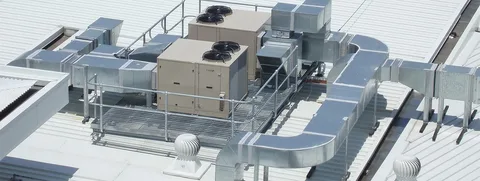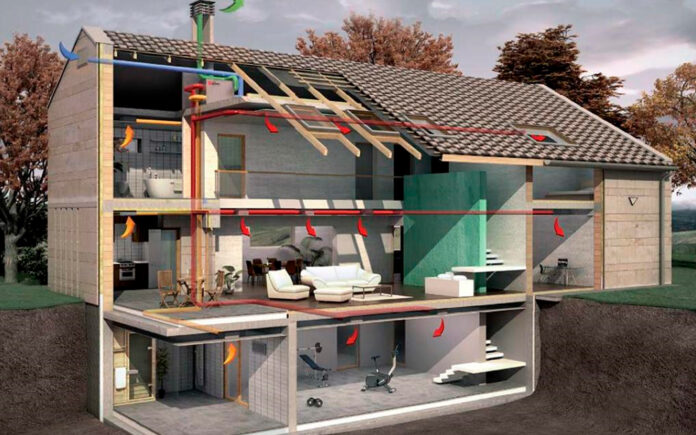Having a good ventilation system is essential for any home. A balanced ventilation system is especially important because it helps keep indoor air fresh and healthy while also improving your home’s energy efficiency. In this blog post, they’ll explore reasons why you should invest in a ventilation system for your home. By understanding the benefits of a ventilation system, you can make an informed decision on whether it’s the right choice for you. The ventilation system is an important component of any home. Proper ventilation helps to maintain air quality and reduce the risk of moisture buildup, mold, and mildew growth. By installing the ventilation system in your home, you can enjoy a healthier and more comfortable indoor environment.
Increased Comfort
Having a ventilation system in your home can significantly improve the level of comfort that you experience. It is because the system is designed to maintain a consistent level of air circulation throughout your home, which helps to prevent stuffy and stagnant air. The system can also help to control the humidity levels in your home, ensuring that you feel comfortable even during the hottest and most humid months of the year.
With a ventilation system, you will no longer have to worry about opening windows and doors to let in fresh air or running your air conditioner excessively to maintain a comfortable indoor temperature. Instead, you can rely on your ventilation system to do the work for you, providing you with a steady stream of fresh, clean air and keeping your home at a consistent temperature and humidity level. This will help to improve the overall quality of life in your home, making it a more comfortable and pleasant place to be.
Provide Health Benefits
One of the most important benefits of using a ventilation system is the improved health of the occupants. Proper ventilation helps to reduce the amount of pollutants and allergens in the air, such as dust, mold, and bacteria. It is particularly important for those who suffer from allergies or respiratory issues, as well as young children and the elderly.
A well-ventilated home also helps to prevent the buildup of harmful gases, such as carbon monoxide and radon, which can be deadly if left undetected. By continually exchanging stale indoor air with fresh outdoor air, a ventilation system ensures that the indoor environment is healthy and safe.
Moreover, ventilation systems can also help to control humidity levels, which is crucial for preventing the growth of mold and mildew. High humidity can also make the air feel stuffy and uncomfortable, which can lead to health issues such as headaches, fatigue, and respiratory problems.
In short, a well-designed and properly installed ventilation system can provide numerous health benefits by improving indoor air quality and reducing the risk of exposure to harmful pollutants. By investing in a ventilation system, you are not only enhancing your comfort but also safeguarding the health of your family and loved ones.
Fresh Air Heater Improved Indoor Air Quality
Indoor air quality is often a concern for homeowners. It’s important to breathe clean air in your home to ensure good health and well-being. However, it’s not always possible to achieve this without proper ventilation. That’s where a fresh air heater comes in.
A fresh heater provides a continuous supply of fresh air into your home, ensuring that the air is constantly circulated and filtered. It helps to reduce the number of allergens and pollutants in the air, resulting in improved indoor air quality.
One of the main benefits of using an air heater is that it can help to reduce the symptoms of allergies and asthma. When your home is properly ventilated, it helps to remove irritants from the air, such as dust, pet dander, and pollen. It can help to reduce the severity of allergic reactions and asthma attacks.
In addition, air heaters can help to reduce the concentration of harmful chemicals in the air. Many household products, such as cleaning supplies, contain chemicals that can be harmful when inhaled. A fresh heater can help to remove these chemicals from the air, providing a healthier environment for you and your family.
Energy Efficiency And Cost Savings
In addition to providing fresh and clean air, a ventilation system can also help improve the energy efficiency of your home, ultimately leading to cost savings on your utility bills. These systems are designed to help regulate the temperature and humidity levels in your home, which can reduce the workload on your heating and cooling system.
By utilizing reclaimed ventilation technology, your home can capture the heat generated from exhaust air and reuse it to warm the incoming fresh air, resulting in less energy consumption. This is particularly useful during colder months when homes require more heating. With this system, you can expect lower energy costs without compromising your comfort level.
Moreover, with proper ventilation, your home’s heating and cooling system won’t have to work as hard, which can increase the lifespan of your equipment and reduce maintenance costs over time.
It’s important to note that installing a ventilation system does come with upfront costs, but the long-term benefits can greatly outweigh the initial investment. With lower energy bills, reduced maintenance costs, and an increased lifespan of your equipment, the investment in a ventilation system is well worth it.
Heat Reclaim Ventilation Reduced Moisture And Condensation
Another benefit of a ventilation system is its ability to reduce moisture and condensation in your home. Without proper ventilation, excess moisture from activities such as cooking, showering, and even breathing can lead to problems like mold growth, structural damage, and poor air quality. Fortunately, a heat reclaim ventilation system can help regulate moisture levels by circulating fresh air and removing excess humidity. This not only keeps your home more comfortable, but it also protects against potential health hazards associated with excess moisture.
Reducing moisture in your home also helps to prevent condensation, which can be especially problematic during the colder months. When moist air meets cold surfaces, it can form droplets of water, leading to potential damage to your walls and ceilings. A \reclaim ventilation system helps to control humidity levels, ultimately reducing the risk of condensation-related issues in your home.
Overall, investing in a ventilation system with heat reclaim capabilities can make a significant impact on your home’s comfort, health, and safety. With a system in place, you can rest easy knowing that your home is properly ventilated and protected against the negative effects of excess moisture and condensation.
Residential Roof Ventilation Systems Reduced Noise Levels
One of the lesser-known benefits of using a ventilation system for your home is the reduction in noise levels. Most homeowners are unaware of how noisy their homes can be until they have a proper ventilation system in place. Residential roof ventilation systems can design to keep your home comfortable while reducing the amount of external noise that enters your living space.
With a ventilation system, you can control the amount of air coming into your home while reducing the amount of noise from the outside. It is particularly beneficial for homes located near busy streets or highways. A ventilation system that includes an air-to-air heat exchange unit can also help reduce noise levels by allowing fresh air to be circulated throughout your home without having to open windows or doors.
Environmental Benefits Of Ventilation Systems
Aside from providing comfort, health benefits, energy efficiency, and reduced moisture and noise levels, a ventilation system also has environmental benefits. A ventilation system can help reduce energy consumption, which in turn reduces greenhouse gas emissions. When a home has a proper ventilation system, there is less need for air conditioning, which can help reduce the carbon footprint of a household.
Additionally, a ventilation system can also help remove pollutants and allergens from the air, which can lead to a healthier living environment. By having a ventilation system that constantly brings in fresh air and exhausts stale air, it can reduce the concentration of pollutants and prevent them from building up in a home. This is especially important for individuals with allergies or respiratory conditions.
Furthermore, a well-ventilated home can prevent mold growth, which can have negative environmental impacts. Mold can release spores into the air, which can lead to health problems and cause damage to building materials. By preventing mold growth through proper ventilation, a homeowner can reduce the amount of waste generated by having to replace damaged building materials.
Conclusion
In conclusion, having a ventilation system in your home can provide numerous benefits for you and your family. From increased comfort to improved indoor air quality and reduced energy costs, there are plenty of reasons to invest in a good ventilation system. Additionally, the benefits of such a system extend beyond just the comfort and well-being of your family, as it can also reduce environmental impact.

